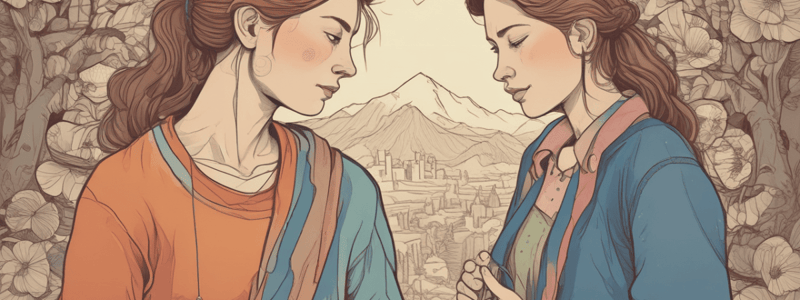Podcast
Questions and Answers
Match the following phases of life with their characteristics:
Match the following phases of life with their characteristics:
Adolescence = Transition from childhood to adulthood Childhood = Development of basic skills and traits Adulthood = Time for independence and responsibilities Teenager = Period of self-discovery and identity formation
Match the following family terms with their definitions:
Match the following family terms with their definitions:
Immediate family = Nuclear family consisting of parents and children Extended family = Relatives beyond the nuclear family, such as grandparents Sibling = A brother or sister Relative = A person connected by blood or marriage
Match the following familial bonds with their descriptions:
Match the following familial bonds with their descriptions:
Brotherhood = A bond between brothers Parent = One who raises and nurtures children Motherhood = The state of being a mother Fatherhood = The state of being a father
Match the following concepts related to growth with their meanings:
Match the following concepts related to growth with their meanings:
Match the following types of relationships with their attributes:
Match the following types of relationships with their attributes:
Flashcards are hidden until you start studying
Study Notes
Stages of Development
- Adolescence marks the transition from childhood to adulthood, characterized by physical, emotional, and psychological changes.
- Adulthood is a stage of maturity where individuals establish independence and often take on family responsibilities.
Family Dynamics
- Bonds within a family unit can include various relationships such as brotherhood, sisterhood, and parent-child connections.
- Childhood experiences shape character development, influencing personality traits and future relationships.
Social Relationships
- Friendship and connection play critical roles in social development, providing emotional support and a sense of belonging.
- Sibling relationships often involve rivalry but can also foster strong connections and lifelong ties.
Instinct and Parenting
- Maternal and paternal instincts drive caregiving behaviors and influence upbringing strategies.
- Active parental involvement nurtures children's emotional and social skills, contributing to a stable upbringing.
Family Structures
- Immediate family includes parents and children, while extended family encompasses relatives outside this core group.
- Family gatherings strengthen ties among relatives and allow for the sharing of traditions and values.
Nature vs. Nurture
- Nature refers to genetic inheritance, while nurture entails the environmental factors and upbringing that shape an individual.
- Temperament, a person's inherent personality trait, can be influenced by both nature and nurture.
Conflict and Resemblance
- Conflict within family settings can arise from differing interests and perspectives, but can also lead to resolution and growth.
- Striking resemblance among family members often highlights genetic connections and shared traits.
Development of Relationships
- Developing strong relationships involves interaction, understanding, and accommodating each other's needs and differences.
- Parental roles significantly impact how children relate to others and develop friendships.
Life Challenges and Growth
- Individuals must endure conflicts and challenges throughout life, which can lead to personal growth and stronger relationships.
- Establishing supportive relationships can help individuals navigate life's difficulties effectively.
Studying That Suits You
Use AI to generate personalized quizzes and flashcards to suit your learning preferences.




